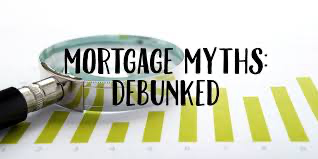
Navigating the world of mortgages can be daunting, especially for first-time homebuyers. With a plethora of information available, it’s easy to get lost in the details and fall prey to common misconceptions. In this article, we will debunk some of the most prevalent myths about mortgages to help you make informed decisions when purchasing a home.
Myth 1: Your Credit Score Must Be Perfect
Another common misconception is that you need a perfect credit score to qualify for a mortgage. While a higher credit score can improve your chances of securing a loan and obtaining a better interest rate, many lenders are willing to work with borrowers who have less-than-perfect credit. There are various loan programs available for individuals with lower credit scores, and improving your credit score over time is always an option. It’s crucial to check your credit report, understand your score, and take steps to improve it if necessary.
Myth 3: Pre-Approval Guarantees a Loan
Many homebuyers believe that getting pre-approved for a mortgage guarantees that they will receive the loan. While pre-approval is an essential step in the home-buying process, it is not a guarantee. Pre-approval indicates that a lender has reviewed your financial information and is willing to lend you a certain amount, but it is contingent upon further verification of your financial status and the property you choose. It’s important to stay in close communication with your mortgage broker throughout the process to ensure that you meet all requirements.
Myth 4: All Mortgages Are the Same
Not all mortgages are created equal. There are various types of mortgage products available, including fixed-rate, variable-rate, offset mortgages, etc., each with its own terms, benefits, and drawbacks. Understanding the differences between these options is crucial for finding the right mortgage for your needs. For instance, a fixed-rate mortgage offers stability with predictable cash flows, while a variable-rate mortgage can fluctuate over time and might be more cost-effective in the long run. Researching and discussing your options with your mortgage broker can help you make an informed choice.
Myth 5: You Should Always Choose the Lowest Interest Rate
While securing a low interest rate is important, it should not be the sole factor in your decision-making process. Other elements, such as loan terms, fees, and the lender’s reputation, should also be considered. A mortgage with a slightly higher interest rate but lower fees may ultimately save you more money in the long run. Additionally, consider the overall cost of the loan, including closing costs and any potential penalties for early repayment. It’s essential to evaluate the complete picture rather than focusing solely on the interest rate.
Myth 6: You Can’t Get a Mortgage if You are Self-Employed
Self-employed individuals often believe that securing a mortgage is impossible due to their income structure. While it can be more challenging to prove income stability, it is not impossible. Lenders typically require additional documentation, such as audit reports, profit and loss statements, and bank statements, to assess your financial situation. However, many lenders are experienced in working with self-employed borrowers, so it’s worth exploring your options with your mortgage broker and finding a lender who understands your unique circumstances.
Conclusion
Understanding the truth behind these common mortgage myths can empower you as a homebuyer. By dispelling these misconceptions, you can approach the mortgage process with confidence and make informed decisions that align with your financial goals. Always do your research, consult with professionals, and remember that the right mortgage for you is one that fits your individual needs and circumstances. Happy house hunting!